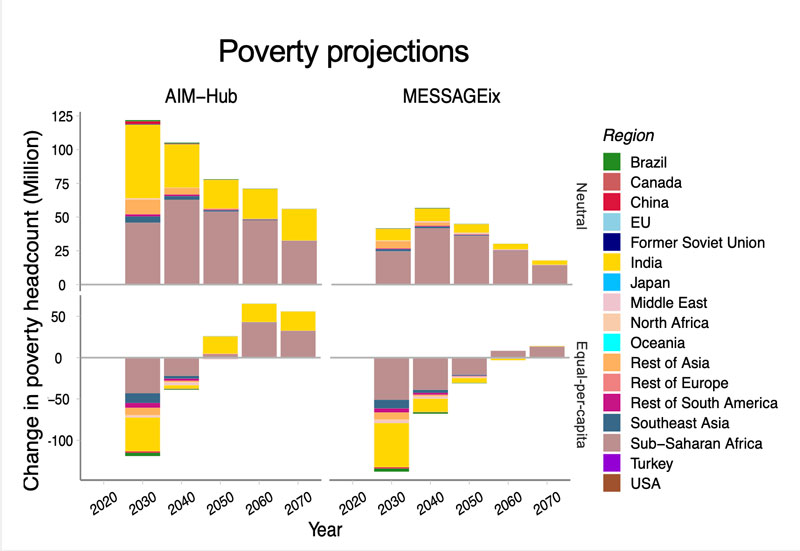Kyoto, Japan -- As extreme weather events become more frequent and the impacts of climate change become stronger, countries around the world are strengthening their decarbonization efforts. The 2016 Paris Agreement in particular represents a global effort to address climate change by limiting the rise in global average temperature to well below 2˚C.
However, concerns have been rising about the economic costs of these transitions. Previous studies suggest that stringent greenhouse gas emissions mitigation may cause an increase in food and energy prices, exacerbating poverty and inequality. How to address these social impacts in the context of society-wide decarbonization remains unclear.
In response, an international research team led by Shiya Zhao from Kyoto University and the International Institute for Applied Systems Analysis -- IIASA -- in Austria created a comprehensive study to assess the ramifications of decarbonization. Their goal is to steer policy formulation toward a sustainable and equitable trajectory for climate change mitigation.
"The unintended side effects on vulnerable individuals and systems are often difficult to detect without model-based research," says Zhao. "Our team is committed to sharing scientific insights with society to inform more just and effective policy-making."
The research team developed two energy-economic system simulation models and a household income-expenditure simulation model to quantify global decarbonization's impact on poverty and inequality across 180 countries. Using the models, they investigated scenarios in which societies continue to rely on fossil fuels, and scenarios achieving deep decarbonization targets. Within the latter scenarios, they further investigated the utilization of carbon tax revenues to address such social impacts.
The findings revealed that redistributing domestic carbon revenues to lower-income groups could significantly alleviate poverty and reduce inequality in many countries. However, this approach alone would not be sufficient.
While decarbonizing society is an urgent matter, this study suggests that it could exacerbate poverty and widen inequality in some low-income countries, if climate policies are not carefully designed and implemented. India and other countries in Asia, as well as Sub-Saharan Africa, seem particularly vulnerable. Furthermore, redistribution of carbon tax revenue can be effective in offsetting adverse policy impacts in the near-term, but may not be enough to fully eradicate poverty in many countries.
This study highlights that in many developing countries, achieving a just decarbonization transition requires careful policy design involving not only changes in the energy system, but also strong international cooperation that considers social development issues.
"It is crucial to explore climate policies and countermeasures from multiple perspectives," says Zhao. "Such efforts must go beyond current evaluations and move towards a more comprehensive understanding and response at a societal level."
It is important to note that, while this study focused on the impacts associated with decarbonization, poverty and inequality are also strongly influenced by the impacts of climate change itself, which are outside the scope of this analysis. Future research should aim to incorporate these effects.







